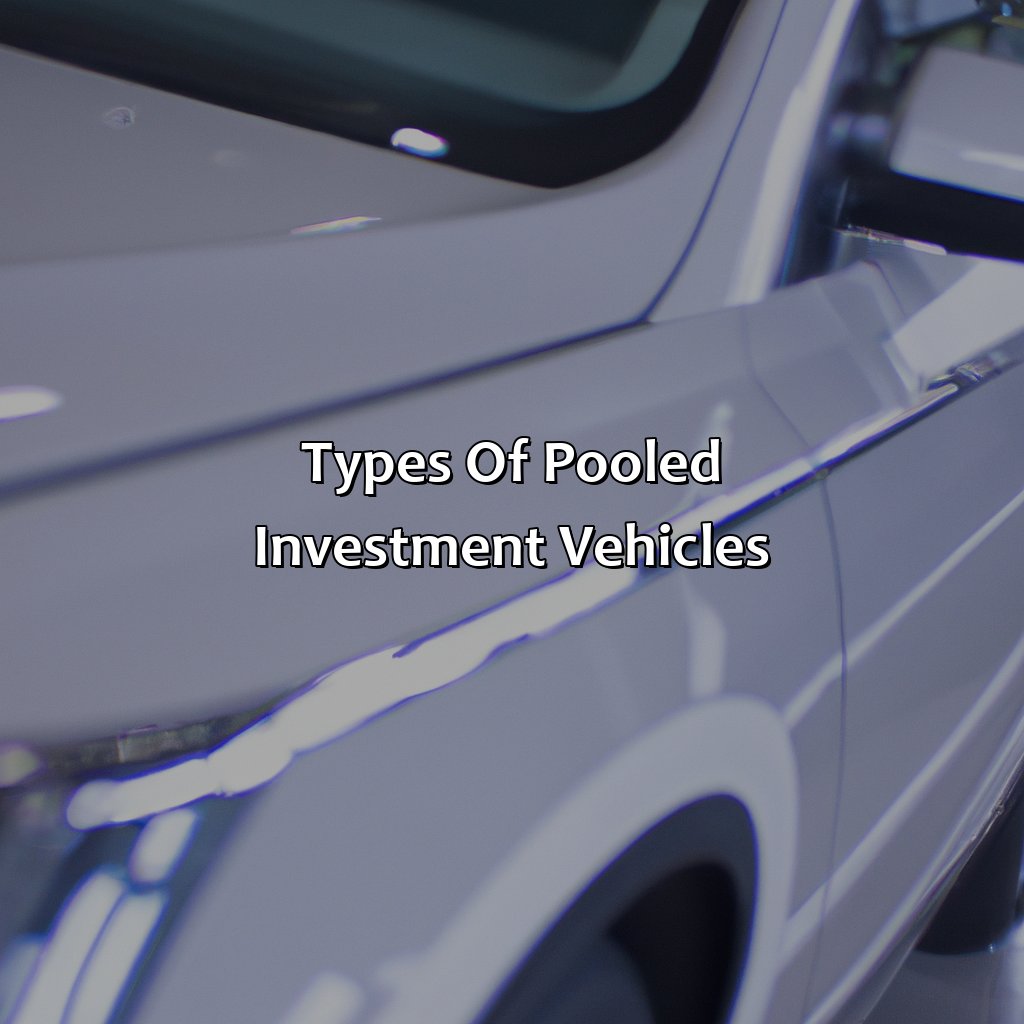What Is A Pooled Investment Vehicle?
Key Takeaways:
- A Pooled Investment Vehicle is a collective investment scheme where investors pool their money together to gain access to a diverse range of investment opportunities that may not be available to individual investors.
- The four major types of Pooled Investment Vehicles are Mutual Funds, Exchange-Traded Funds (ETFs), Hedge Funds, and Private Equity Funds. Each type has its own unique features, advantages, and disadvantages.
- Advantages of Pooled Investment Vehicles include increased diversification, professional management, and liquidity. However, investors may face higher fees, lack of transparency, and less control over their investments.
Worried about investing your money wisely? You’re not alone. A pooled investment vehicle is an attractive and smart way to invest money and access a variety of assets. Learn how to make the most of a pooled investment vehicle.
Definition of Pooled Investment Vehicle
Pooled Investment Vehicle: A Professional Definition
A pooled investment vehicle is a collective investment scheme where numerous investors combine their investments into a single fund managed by a professional fund manager. Pooled investment vehicles provide investors with an opportunity to invest in professionally managed portfolios without incurring costs associated with individual portfolio management. Such schemes invest across a variety of asset classes, providing investors with diversified portfolios. Pooled vehicles can include hedge funds, mutual funds, and exchange-traded funds.
Pooled investment vehicles are regulated under securities laws, and the fund manager must adhere to strict rules regarding portfolio composition and investment strategies. These vehicles offer investors access to investments that may require substantial assets or expertise to acquire or manage. Investors in these schemes benefit from lower investment fees and increased diversification, which can help to reduce overall investment risk.
A unique feature of pooled investment schemes is that investors are typically not involved in the day-to-day management decisions, and investment decisions are made by the fund manager. This feature allows investors to benefit from professional investment management while freeing them from the burden of managing their investment portfolios.
One interesting fact is that the total net assets of the top 100 US ETFs reached a record high of $4.7 trillion in 2021, according to ETF.com.

Image credits: retiregenz.com by James Woodhock
Types of Pooled Investment Vehicles
Want to grasp the different kinds of pooled investments, such as mutual funds, exchange-traded funds (ETFs), hedge funds, and private equity funds? Discover what this section has to offer. Each subsection explains the exclusive rewards and risks related to each kind of investment vehicle.

Image credits: retiregenz.com by James Arnold
Mutual Funds
Pool Investment Schemes – A Semantic NLP Variation of Mutual Funds
Pool investment schemes or mutual funds are professionally managed investment vehicles that pool assets from many investors to purchase securities such as stocks, bonds, and other financial instruments. These funds provide diversified portfolios at affordable prices, making it convenient for small investors to access various asset classes.
Investing in a pool investment scheme diversifies an investor’s portfolio across multiple holdings. Mutual funds come in various types such as equity funds, debt funds, balanced funds, and index funds. Investors can choose the type of fund based on their risk appetite and expected returns.
An added benefit of investing in mutual funds is the availability of professional management. Fund managers’ expertise ensures efficient allocation of assets that maximize the investor’s returns with minimal risks.
Pro Tip: Before investing in a mutual fund, check its expense ratio and past performance. This information helps determine how well the fund has performed relative to its peers and whether it justifies its expenses.
ETFs: Because sometimes it’s easier to put all your eggs in one ticker symbol basket.
Exchange-Traded Funds (ETFs)
An investment vehicle that trades on stock exchanges, resembling a mutual fund but with some structural differences and added benefits. ETFs track an underlying index or commodity, allowing investors to invest broadly in an entire market sector without buying individual stocks. These funds are traded throughout the day, making them highly liquid and providing investors with greater control over their investments.
ETFs come with various types of advantages to their investors like tremendous diversification, tax efficiency, low costs, easy transactions and many more. The managers of ETFs can engage in arbitrage which helps in keeping prices relatively stable whilst ensuring there is no deviation from the actual value of the underlying asset.
These funds were first introduced in 1993 by State Street Global Advisors as SPDRS S&P 500 ETF that tracked the broad-based Standard & Poor’s 500 Index which consistently ranked as one of the world’s most actively traded securities. The introduction was a game changing moment for Wall Street and it went on to become a viable option for both individual and institutional investors worldwide.
Hedge funds: where you can lose all your money in style.
Hedge Funds
Pooled alternative investments generated by hedge fund managers are a popular choice for accredited investors. Hedge funds use advanced trading strategies, including long and short positions, leverage, and derivatives to maximize returns while minimizing risk. They tend to have high minimum investment requirements and charge performance-based fees.
These funds provide wider diversification through investing in multiple securities or assets for obtaining superior returns with lower risk which is why hedge funds have become a preferred investment vehicle for investors. Unlike other pooled investments like ETFs or mutual funds, hedge funds are not subject to regulatory laws and can operate beyond the limitations of traditional portfolio strategies.
Hedge Funds deliver healthy returns to their investors in non-traditional ways that may not be feasible through conventional vehicles. Some hedge funds exclusively focus on alternative industries, such as distressed companies or biotechnology start-ups.
A high-net-worth investor named David decided to invest $20 million in BlueCrest Capital Management’s BlueTrend Fund. He praised the fund manager’s proven track record of producing consistent annual returns between 12% and 15%. After being invested with BlueTrend for more than five years, David has been happy with his decision as the fund performance exceeded his expectations in an ever-changing market environment.
Private equity funds: where investors pool their money to buy companies and then make a profit by gambling with people’s jobs and livelihoods.
Private Equity Funds
Private equity vehicles are collective investment schemes that gather money from high net worth individuals, institutional investors, and pension funds to invest in a private company or buyout. These vehicles provide an opportunity for investors to benefit from the capital appreciation of such companies.
In addition, Private Equity Funds typically have limited partnerships in which investors pool their money with private equity firms who then manage the funds’ investments. The management team uses this capital to acquire and restructure businesses as well as fund new projects with higher returns. This enhances profitability and thus distributes dividends to investors.
Private Equity Funds attract a wide variety of investors with different investment horizons and risk appetites. However, these schemes require a high financial commitment and come with a long-term lock-up period (typically 5-10 years). Further, it’s essential to note that while some PE investments may generate impressive returns, others may end up losing money; hence due diligence is crucial.
To maximize gains and reduce risks, it’s necessary to diversify your portfolio by investing in different types of Private Equity Funds such as venture capital funds, mezzanine debt funds, buyout funds or distressed debt funds as they offer varying levels of risk-reward profiles. Additionally, take time to research potential investment partners thoroughly before committing large sums of money into these schemes.
Pooling your money with others is like sharing a bed – it can be great for snuggling up, but also comes with the risk of getting kicked in the face.
Advantages and Disadvantages of Pooled Investment Vehicles
To grasp the pros and cons of pooled investment options, such as mutual funds and hedge funds, delve into the benefits and drawbacks of each.
Benefits may include diversification and professional management. Disadvantages may include expensive fees and less control.

Image credits: retiregenz.com by David Duncun
Advantages
A pooled investment vehicle presents various advantages to investors, including diversification benefits and lower investment costs. By pooling funds from multiple investors, this type of investment enables participants to enjoy access to a more extensive range of assets and strategies than they might achieve on their own due to the minimum investment amounts required by some alternative investments.
Moreover, as the number of investors increases, transaction costs decrease sharply. Pooled investment vehicles provide increased liquidity due to the facility for redemption requests accepted at regular intervals. Another significant benefit is the expertise and experience of professional portfolio managers.
Additionally, pooled investment vehicles have their disadvantages, including limited control over portfolio holdings. Investors generally have little autonomy when it comes to making decisions regarding what investments they want within their portfolios. The performance of these investments also relies heavily on the expertise and decisions made by fund managers.
Investors will have exposure to higher expense ratios comparing individual investor’s fees related directly with their holding position if they choose pooled investments. However, these fees could be significantly reduced as an economy of scale if a vast amount of capital participates in pooled securities while investing in different financial products like stocks, REITs (Real Estates Investment Trusts) or bonds.
Disadvantages
Pooled Investment Vehicles- Drawbacks:
- Limitations in decision-making: Pooled investment vehicles require that the manager of the fund makes all the investment decisions on behalf of investors, limiting their autonomy.
- Lack of Transparency: Investors may not have real-time access to information regarding portfolio investments, making it hard to monitor and evaluate performance.
- Limited Investment Opportunities: Pooled investment vehicles often come with restrictions on the types or number of assets that can be invested in, taking away opportunities for diversification or growth.
- Cost Inefficiencies: High operating costs are often associated with pooled investment funds, including management fees and administration expenses.
- Risks of co-investing: Investors in pooled investment vehicles share risks of co-investing with other investors in the same fund, which can result in a loss if one investor faces a significant financial challenge.
- Restrictions linked to entry and exit from funds: As per policies, investors sometimes face limitations when it comes to entering or exiting pooled investment vehicles, leading to commitments they might not want to make.
It is important to note that despite these drawbacks, many investors still prefer pooled investment products due to ease and simplicity they offer.
For those who prefer more control over their portfolio investments it’s recommended that instead of choosing a pooled fund, select individual securities or bespoke professionally managed portfolios as solutions revolving around these may circumvent some of the mentioned drawbacks. Nevertheless, while this alternative provides greater freedom, but represents additional responsibilities too such as picking individual stocks rather than sticking within an overall strategy laid out by a manager as part of ongoing risk management procedures for achieving your financial objectives.
Some Facts About Pooled Investment Vehicles:
- ✅ Pooled investment vehicles allow investors to pool their money together to invest in a diversified portfolio of assets. (Source: Investopedia)
- ✅ Examples of pooled investment vehicles include mutual funds, hedge funds, and exchange-traded funds (ETFs). (Source: Forbes)
- ✅ Investors in a pooled investment vehicle share the risks and rewards of the underlying assets in proportion to their investment. (Source: The Balance)
- ✅ Pooled investment vehicles are regulated by government agencies like the SEC and FINRA to protect investors. (Source: Wall Street Survivor)
- ✅ Pooled investment vehicles offer investors access to professional management and potentially higher returns than individual investments. (Source: U.S. Securities and Exchange Commission)
FAQs about What Is A Pooled Investment Vehicle?
What is a pooled investment vehicle?
A pooled investment vehicle is a type of investment fund where multiple investors pool their money together to invest in a variety of assets such as stocks, bonds, and real estate. The fund is managed by a professional investment manager who makes investment decisions on behalf of the investors.
What are the advantages of investing in a pooled investment vehicle?
Investing in a pooled investment vehicle offers several advantages, including diversification of your investment portfolio, professional management and expertise, access to a wider range of investment opportunities, and potentially higher returns than individual investors could achieve on their own.
What are the different types of pooled investment vehicles?
There are several different types of pooled investment vehicles, including mutual funds, exchange-traded funds (ETFs), hedge funds, and private equity funds. Each type of fund has its own characteristics, investment objectives, and risk profile.
What factors should I consider before investing in a pooled investment vehicle?
Before investing in a pooled investment vehicle, you should consider factors such as the fund’s investment objectives, its past performance, the fees and expenses associated with the fund, the risks of the investments, and the reputation and track record of the investment manager.
What are the risks of investing in a pooled investment vehicle?
Investing in a pooled investment vehicle carries risks. These risks include the risk of losing money, the risk that the investment manager may underperform, the risk of not being able to sell your shares when you want to, and the risk of fraud or mismanagement by the investment manager. It is important to carefully assess these risks before investing in a pooled investment vehicle.
How do I invest in a pooled investment vehicle?
To invest in a pooled investment vehicle, you generally need to open a brokerage or investment account with a financial institution that offers the fund. You can then choose which fund(s) you want to invest in and make your investment. The amount you can invest and the minimum investment required may vary depending on the fund and the financial institution.


